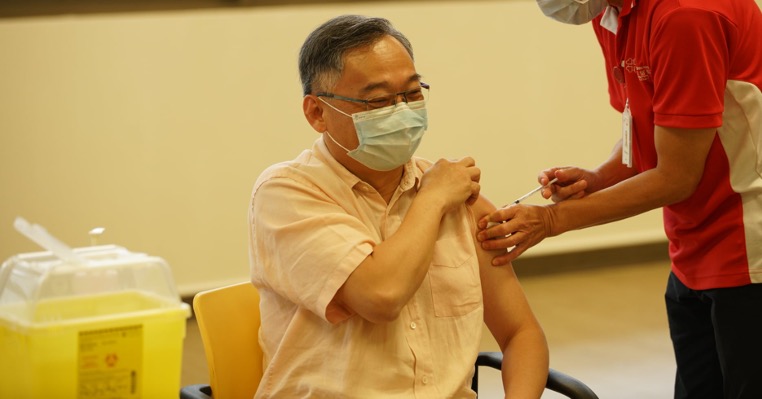Health Minister Gan Kim Yong announced on May 11 that Singaporeans under 45 will be progressively invited to receive the Covid-19 vaccine in the "latter part of May."
Gan announced:
"We will be inviting subsequent age bands to receive vaccinations from the latter part of May. However, as vaccine supplies continue to be limited, vaccinations will be progressively extended in smaller age-bands. We thank everyone for their patience. If vaccine supplies arrive as scheduled, we will complete the vaccination programme by the end of the year."
On Covid-19 variants
There have been 10 different variants of SARS-CoV-2 detected so far, which the Ministry of Health (MOH) updated on May 4.
It is not surprising to see such variants in Singapore because we cannot completely seal our borders, as Singapore is not completely self-sufficient, Gan said.
However, the concern is such variants could have greater transmissibility, resistance to vaccines or the severity of illness caused, Gan said:
"Sequencing results indicate that the recent clusters at TTSH, ICA and Tuas South CCF were driven by the B.1.617.2 variant that was first detected in India. Three of the recent cases at our airport terminals also tested preliminarily positive for B.1.617."
On vaccination numbers
Gan elaborated on the lessons learned so far about the variants and the protection afforded against them by vaccines.
- The B.1.617.2 variant appears "very infectious", and there will be other variants just like it.
- Vaccines are not a 100 per cent guarantee against infection, but it helps to prevent severe illness if one is infected.
- Vaccines also reduce the risk of further transmission, but the extent of this is still being studied.
- Therefore, it's clear that vaccination is most effective when combined with other measures, such as mask-wearing, safe distancing and testing.
In response to questions from Non-Constituency Member of Parliament (NCMP) Leong Mun Wai from the Progress Singapore Party, and other MPs Alex Yam and Ang Wei Neng, Gan stated that as of May 9, about 1.8 million individuals have received at least one dose of the vaccine.
Of these, about 1.2 million individuals have received their second dose and completed the full vaccination regimen.
The vaccine take-up rate has been encouraging, with about two-thirds of those aged 45 and above having booked their vaccination appointments, or received them already.
On vaccine effectiveness
Gan said vaccinations significantly reduces the chance of infections, prevents severe reactions to infections, and is likely to reduce onward transmission of infection.
As of May 10, locally, 30 local and 24 imported cases were fully vaccinated. 57 per cent of these local cases were asymptomatic, and none had severe complications requiring intensive care. This is consistent with data from other countries.
For re-infected cases, Gan said that as of May 10, Singapore has detected 26 such cases. Whether this is due to waning immunity over time, or due to variants, is still under investigation.
Gan said, "Overall, the benefits of the Pfizer-BioNTech and Moderna Covid-19 vaccines continue to outweigh the known risks and we must continue to encourage Singaporeans to be vaccinated."
In response to questions from MPs Louis Ng, Cheryl Chan and Gerald Giam and Louis Chua of the Workers' Party (WP), Gan gave more information on vaccinations for children, those with allergic reactions, and the need for booster shots.
- Currently, the Pfizer and Moderna vaccines are authorised for people 16 and 18 and above, respectively.
- The Health Sciences Authority (HSA) is examining data to see if Pfizer can be used for those aged 12 to 15, and will do so for Moderna when the data is available.
- Currently, there is not enough data to say whether children below 12 can take the vaccine.
As for people with mild allergic reactions, persons who have been assessed by a doctor to be allergic to the first dose of Covid-19 vaccination are currently contraindicated from the vaccine and should not continue with the second dose.
They will be kept in the records and contacted if new evidence shows that they can take the vaccine, or if new vaccines are made available. As for booster shots, data is still being gathered, and Gan urged people to get their two shots first.
On adverse events from vaccination
In response to questions from Leong Mun Wai and Dennis Tan of the WP, Gan stated that as of April 18, there have been 2,796 suspected adverse events associated with the Covid-19 vaccine.
Gan said, "Only 0.004 per cent of our doses administered had reported serious adverse events."
Most side effects reported are not serious, such as dizziness or muscle pain, and are resolved within a few days. Singapore has so far not seen cases of unusual blood clots associated with low platelets.
HSA produced a report on adverse events on May 6, which is also available on the MOH website, and will be updated regularly. HSA is actively monitoring reports from healthcare practitioners of adverse events.
On Sinovac approval
In response to questions from MPs Cheng Li Hui, Liang Eng Hwa, and Sylvia Lim of the WP, Gan said that Sinovac was purchased under an advance purchase agreement, same with Pfizer and Moderna, that enabled Singapore to start its vaccination rollout earlier on.
Based on the schedule, Singapore has taken in a shipment of the Sinovac vaccine. Gan said, "HSA is currently carefully evaluating Sinovac and a few other vaccines for use in Singapore, and we will update the public when we have made progress."
In his conclusion, Gan thanked members of the Multi-Ministry Task Force, healthcare professionals, and Singaporeans for their support, patience and sacrifices.
Gan will be leaving his role as Health Minister to become Minister for Trade and Industry, but he will continue to co-chair the Task Force together with Lawrence Wong and Ong Ye Kung.
Top image from Gan Kim Yong's Facebook page.
If you like what you read, follow us on Facebook, Instagram, Twitter and Telegram to get the latest updates.
